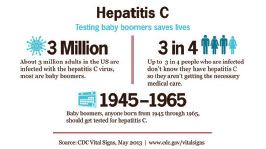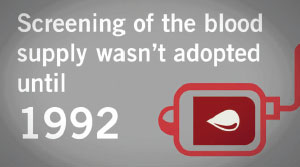By: Neha Sharma

Baby boomers, have you been tested for Hepatitis C? If not, the Centers for Disease Control and Prevention recommends that you get tested now.
Hepatitis C is an infection caused by the Hepatitis C virus that attacks the liver and leads to inflammation. According to the CDC, 3.2 million people in the United States currently have Hepatitis C. Baby boomers are five times more likely to have Hepatitis C than any other adults. It is estimated that three quarters of all Hepatitis C infections occur in baby boomers and most of them don’t know it because they don’t experience symptoms.
 An infected person may unknowingly pass the infection to another person through multiple processes such as: contact with infected blood or the sharing of needles, the infection can be transmitted from mother to baby during childbirth and, although rare, Hepatitis C can also be transmitted through sexual intercourse. The risk is higher if you have had multiple sexual partners, used illegal drugs, or had a blood transfusion before 1992.
An infected person may unknowingly pass the infection to another person through multiple processes such as: contact with infected blood or the sharing of needles, the infection can be transmitted from mother to baby during childbirth and, although rare, Hepatitis C can also be transmitted through sexual intercourse. The risk is higher if you have had multiple sexual partners, used illegal drugs, or had a blood transfusion before 1992.
The reason behind baby boomers—people born between 1945-1965—having high rates of Hepatitis C is not completely understood. It is possible that a lack of universal precautions and infection control procedures at that time may have played a part. Others could have gotten infected through contaminated blood and blood products before widespread screening eliminated the virus from blood supply in 1992.
Unfortunately, many baby boomers got infected before the complications and details of Hepatitis were extensively studied. Today, the disease is well understood and treatment has evolved immensely.
Most infected people develop a chronic infection. The disease process can be slow and insidious so decades may pass without any noticeable symptoms. Symptoms, if present, include: fatigue, muscle aches, unexplained itching, easy bruising and light colored stools. The advanced form of the disease manifests itself as: mental status changes, abdominal swelling, vomiting blood or dark tarry stools.
Screening all baby boomers, by performing a simple blood test, enables physicians to identify and treat more patients in the early stages of the disease process. This also leads to less complications and reduces the cost of treatment. 
Talking to your health care provider is the first step to treatment. Since testing is simple, timely intervention can prevent complications. The two most common complications of Hepatitis C are liver cancer and liver cirrhosis. Treatment of Hepatitis C focuses on elimination of the virus and preventing progression to cirrhosis and cancer, and thus preventing the need for liver transplantation and reducing health care costs. If you are a baby boomer, talk to your doctor about Hepatitis C today!



